Our Network
Members R-Z

Sheena Radford
Astbury Centre for Structural Molecular Biology, University of Leeds
We use biochemical, biophysical and structural methods to map the pathways of protein aggregation into amyloid and how the biological environment may alter the course of assembly. A second part of the lab work on chaperoning outer membrane proteins into the outer membrane of Gram negative bacteria and the opportunities of targeting these pathways for the development of new antimicrobial strategies.
Keywords: Aggregation; Protein folding and chaperones; Neurodegeneration

Charalampos (Babis) Rallis
School of Biological and Behavioural Sciences, Queen Mary University of London
We study proteostasis and its precise links to nutrient-responsive pathways such as the mechanistic target of Rapamycin (mTOR), in cellular space and time. We use the fission yeast Schizosaccharomyces pombe, mammalian 2D and 3D tissue culture systems and C. elegans. We utilise multi-omics approaches, microscopy and network biology. Our aim is to illuminate molecular mechanisms and principles behind senescence and lifespan regulation and apply this knowledge for the amelioration of age-related diseases such as neurodegeneration and cancer.
Keywords: Ageing; Protein translation and ribosomes; Neurodegeneration

Claire Robinson
Conway Institute, School of Medicine, University College Dublin, Ireland
The primary focus of our lab is to understand the roles of the unfolded protein response in cancer. We are particularly interested in investigating if targeting individual arms of the unfolded protein response may be therapeutically viable in the treatment of cancer.
Keywords: Stress responses; Cancer; Mammalian models / cell culture
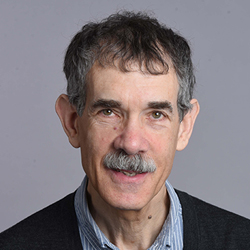
David Ron
CIMR, University of Cambridge
Our lab studies mechanisms used by cells to cope with the consequences of deviation from proteostasis in the endoplasmic reticulum (so-called ER stress). Presently we focus on the upstream mechanisms involved in stress signal recognition and on those downstream effector functions that link changes in ER proteostasis to control of mRNA translation (i.e., the Integrated Stress Response, or ISR) and to post-translational regulation of the ER Hsp70 BiP by its reversible AMPylation and de-AMPylation.
Keywords: Protein translation and ribosomes; Stress responses; Protein folding and chaperones
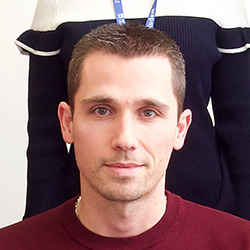
Adrien Rousseau
MRC Protein Phosphorylation and Ubiquitinylation, University of Dundee
Our research group focusses on understanding the spatio-temporal regualtion of proteasome homeostasis during stress underlying diseases. We also aim at engineering the proteasome to establish new cell-based assays to identify new factors and drugs modulating proteasome function for potential therapeutic benefits.
Keywords: Protein degradation; Stress responses; Protein translation and ribosomes

Ari Sadanandom
Department of Biosciences, University of Durham
UKProNet Co-lead
My laboratory’s main focus is to understand the role of protein modification systems in particular Ubiquitination and SUMOylation in regulating plant responses to the environment. My laboratory has demonstrated that SUMOylation coordinates growth control with changing environmental conditions by directly modifying the activity of major transcriptional regulators in plants.
Keywords: Condensates; Plants; Post-translational modifications (PTMs)

Rahul Samant
Signalling Programme, Babraham Institute
Our group uses multi-dimensional proteomics, live-cell imaging, and ubiquitin biochemistry to understand how ubiquitin-mediated signalling mediates misfolded protein quality control in healthy and diseased cell contexts. A major current focus is on how the proteostasis network is re-wired in a range of non-proliferative cellular states, with the goal of harnessing vulnerabilities to promote healthy ageing.
Keywords: Ubiquitin; Stress responses; Chaperones; Ageing; Senescence

Ritwick Sawarkar
MRC Toxicology Unit
Organiser of the 2024 ProteostasisUK Conference
Our research group focusses on elucidating mechanisms by which mammalian cells sense and respond to proteotoxic stress. We use genetic, biochemical and cell biological approaches and test our hypotheses in mouse models of ageing and neurodegeneration. Our aim is to identify new therapeutic opportunities for proteotoxic diseases.
Keywords: Heat-shock response, Chaperones, RNA therapeutics

Louise Serpell
Sussex Neuroscience, School of Life Sciences University of Sussex
Our research focusses on protein misfolding, self-assembly and toxicity of misfolded proteins. Our work spans structural biology and cellular biology. Currently the focus of the laboratory is on Alzheimer's disease, particularly related to Amyloid-beta and Tau self-assembly and associated neurodegenerative mechanisms.
Keywords: Aggregation; Neurodegeneration; Lysosome
Steven Spoel
Institute of Molecular Plant Sciences, School of Biological Sciences, University of Edinburgh
Steven's research aims to improve plant health in an ever-changing environment. This is vital for the sustainable future of agriculture and for establishing food security for a growing global population. His current focus is to understand how dynamic changes in the epiproteome, representing the chemical modifications that control activities of cellular proteins and enzymes, enable plants to launch effective immune responses.
Keywords: Plants, Protein degradation, Post-translational modifications (PTMs)
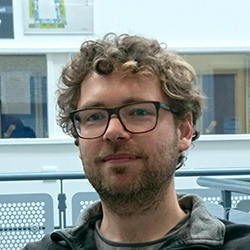
Joe Swift
Manchester Cell-Matrix Centre, University of Manchester
My group is interested in how physical inputs are transmitted from matrix to cell, and how cells and tissues are protected from demanding physical environments. We seek to understand how these pathways change during ageing and disease processes, which oftentimes result in tissue stiffening and a diminished cellular capacity for repair and regeneration.
Keywords: Protein folding and chaperones; Ageing; Stress responses

Frederica Theodoulou
Plant Sciences and the Bioeconomy, Rothamsted Research
We study diverse aspects of plant proteostasis, from fundamental mechanisms governing protein synthesis and degradation, to the ultimate application of this knowledge for crop improvement. Current interests include understanding the genetic architecture of protein abundance in plants, targeted protein degradation mechanisms, in particular the N-degron pathways, proteostatic and other mechanisms involved in oxygen sensing and flood tolerance, tools to study protein lifetime, and the impact of transgenesis on the proteome.
Keywords: Protein folding and chaperones; Stress responses; Plants

George Tofaris
Kavli Institute for Nanoscience Discovery Nuffield, Department of Clinical Neurosciences, University of Oxford
Our aim is to understand fundamental mechanisms that could inform the development of targeted therapies and innovative biomarkers in neurodegeneration with a primary focus on Parkinson's disease. We are currently employing a multifaceted approach encompassing genetic screens, proteomics and transcriptomics in iPSC-based models of increasing cellular complexity and the study of biosamples from clinical cohorts.
Keywords: Neurodegeneration; Aggregation; Protein degradation
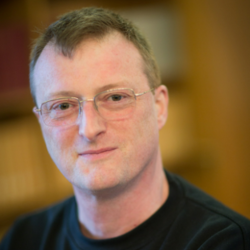
Martin Turner
Immunology Programme, Babraham Institute
Our lab Works collaboratively, uses mouse models coupled with transcriptomic and measurement of RNA/protein interactions highlighting the central role in lymphocyte differentiation and function.
Keywords: Ageing; Cancer; Protein translation and ribosomes
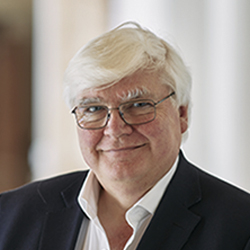
David Vaux
Dunn School of Pathology, University of Oxford
We study pathological and physiological catalytic assembly of host molecules into hydrogels and fibrillar amyloid forms, with especial interest in the roles of hydrophobic-hydrophilic interfaces as modulators of these processes.
Keywords: Condensates; Neurodegeneration; Aggregation
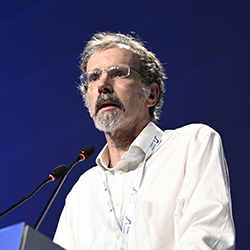
Michele Vendruscolo
Centre for Misfolding Diseases, Department of Chemistry, University of Cambridge
Our research is aimed at understanding the molecular origins of neurodegenerative disorders and at opening novel opportunities for drug discovery to treat these conditions. We set up an interdisciplinary approach that brings together concepts and methods from chemistry, physics, engineering, genetics and medicine, using a combination of in silico, in vitro and in vivo approaches. We are thus investigating the nature and consequences of the failure to maintain protein homeostasis, and its association with ageing and neurodegenerative disorders.
Keywords: Aggregation, Artificial Intelligence, Condensates
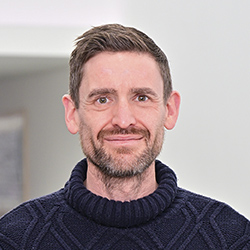
Simon Wilkinson
MRC Institute of Genetics and Molecular Medicine, University of Edinburgh, CRUK Scotland Centre
We investigate molecular mechanisms of autophagic recognition and degradation of aggregation-prone proteins from within the ER lumen. This is coupled with investigation of how these processes fail and thus drive formation of cancer, using mouse models and human tissues.
Keywords: Protein degradation; Model organisms(C. elegans, Drosophila, etc); Cancer

Andy Wilson
School of Chemistry, University of Birmingham
We develop and use chemical biology approaches to study and manipulate transient protein-protein interaction of intrinsically disordered regions. We employ enabling methods for drug-discovery, biophysics & structural molecular biology. Target of interest include proteins involved in cancer and aggregation.
Keywords: Aggregation; Cancer; Post-translational modifications (PTMs)

Paul Workman
Centre for Cancer Drug Discovery, The Institute of Cancer Research
Our primary focus is multidisciplinary research to discover innovative precision medicines that exploit the addictions, dependences and vulnerabilities of human cancers. We especially aim to study and exploit abnormal signal transduction and stress response pathways in cancers cells using the approaches of molecular biology, molecular pharmacology and chemical biology. We also collaborate with clinical colleagues to support the clinical evaluation of our new drugs, especially developing biomarkers for use in the Pharmacological Audit Trail.
Keywords: Cancer; Stress responses; Protein folding and chaperones
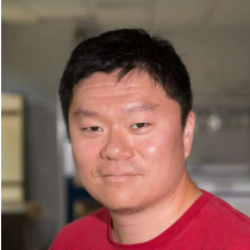
Wei-Feng Xue
School of Biosciences, University of Kent
We are focused on resolving the fundamental mechanisms that govern the formation and the molecular lifecycle of amyloid protein aggregates, and the relationships between amyloid structures and their roles in biology and in disease.
Keywords: Protein folding and chaperones; Aggregation; Condensates